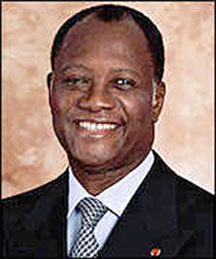UNITED NATIONS, (Reuters) – The U.N. General Assembly on Thursday recognized Alassane Ouattara as Ivory Coast’s legitimate president, after the United Nations said he beat Laurent Gbagbo in last month’s presidential election.

The 192-nation General Assembly formally recognized Ouattara by unanimously deciding that the list of diplomats he submitted to the world body be recognized as the sole official representatives of Ivory Coast at the United Nations. The country’s new U.N. ambassador is Youssouf Bamba.
Gbagbo has refused to quit following a Nov. 28 election that African countries, Western powers and the United Nations say was won by challenger Ouattara, sparking a political crisis that has killed at least 173 people and threatens to reignite the country’s 2002-2003 civil war.
The move by the United Nations will serve to strengthen Ouattara’s claim to be the legitimate leader of Ivory Coast and deepen the isolation of Gbagbo, who has few supporters across the international community, U.N. diplomats told Reuters.
Gbagbo’s U.N. ambassador, Alcide Djedje, already has left New York, as have all of his staff, Western diplomats told Reuters, adding that they had taken computer hard drives from the Ivory Coast mission with them. Djedje is now Gbagbo’s foreign minister.
Separately, the U.N. peacekeeping force in Ivory Coast, known as UNOCI, said it was concerned about “severe violations of human rights and acts of intimidation” in parts of the country’s main city Abidjan and in western Ivory Coast.
“These acts include identifying dwellings by marking them with distinctive signs,” UNOCI said in a statement.
“At night, armed individuals enter people’s residences to perpetrate abductions or commit other crimes,” UNOCI said.









